Entrepreneurship and Small-Business Management Assignment (PDF)
VerifiedAdded on 2021/01/02
|17
|5583
|472
AI Summary
Contribute Materials
Your contribution can guide someone’s learning journey. Share your
documents today.

Entrepreneurship and
Small-Business
Management
Small-Business
Management
Secure Best Marks with AI Grader
Need help grading? Try our AI Grader for instant feedback on your assignments.
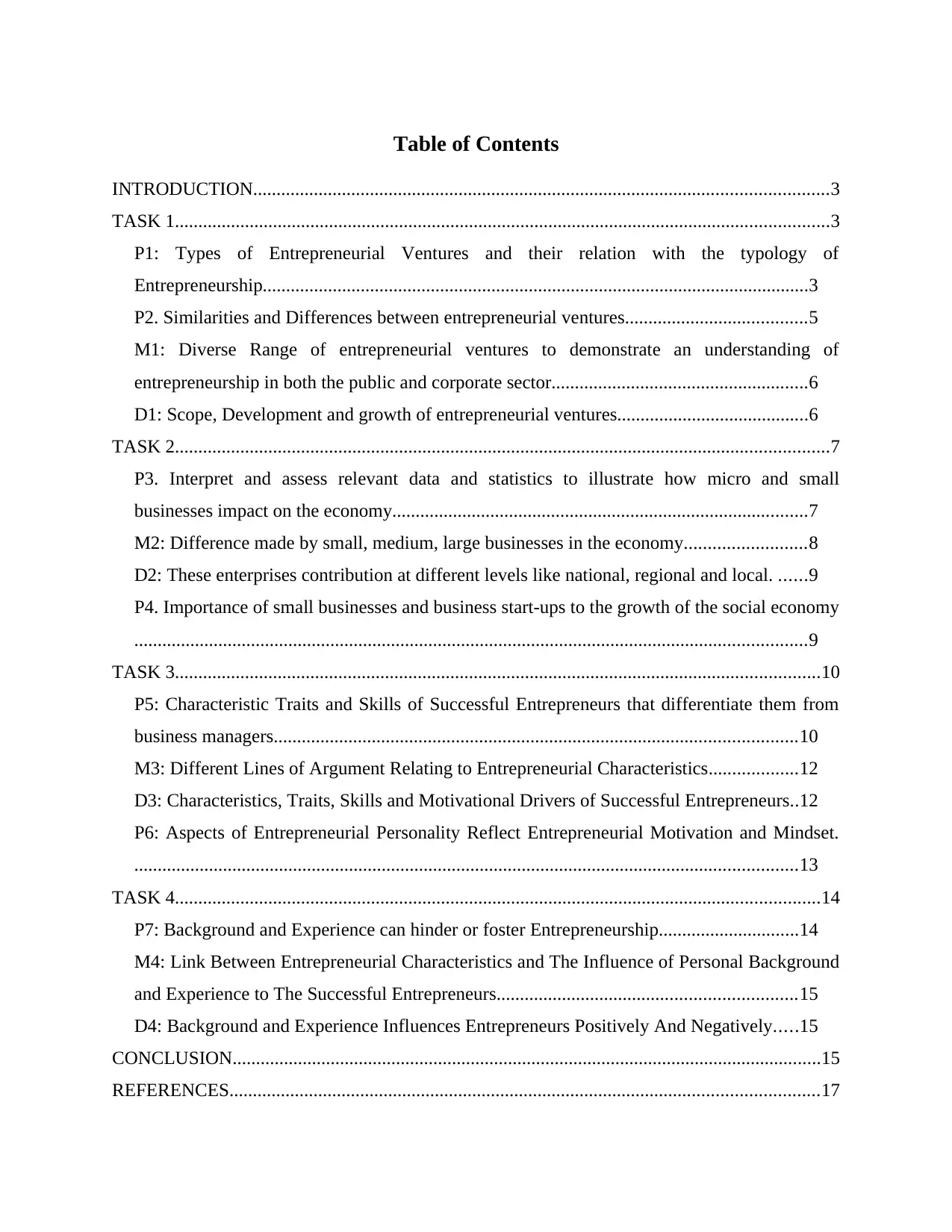
Table of Contents
INTRODUCTION...........................................................................................................................3
TASK 1............................................................................................................................................3
P1: Types of Entrepreneurial Ventures and their relation with the typology of
Entrepreneurship.....................................................................................................................3
P2. Similarities and Differences between entrepreneurial ventures.......................................5
M1: Diverse Range of entrepreneurial ventures to demonstrate an understanding of
entrepreneurship in both the public and corporate sector.......................................................6
D1: Scope, Development and growth of entrepreneurial ventures.........................................6
TASK 2............................................................................................................................................7
P3. Interpret and assess relevant data and statistics to illustrate how micro and small
businesses impact on the economy.........................................................................................7
M2: Difference made by small, medium, large businesses in the economy..........................8
D2: These enterprises contribution at different levels like national, regional and local. ......9
P4. Importance of small businesses and business start-ups to the growth of the social economy
................................................................................................................................................9
TASK 3..........................................................................................................................................10
P5: Characteristic Traits and Skills of Successful Entrepreneurs that differentiate them from
business managers................................................................................................................10
M3: Different Lines of Argument Relating to Entrepreneurial Characteristics...................12
D3: Characteristics, Traits, Skills and Motivational Drivers of Successful Entrepreneurs..12
P6: Aspects of Entrepreneurial Personality Reflect Entrepreneurial Motivation and Mindset.
..............................................................................................................................................13
TASK 4..........................................................................................................................................14
P7: Background and Experience can hinder or foster Entrepreneurship..............................14
M4: Link Between Entrepreneurial Characteristics and The Influence of Personal Background
and Experience to The Successful Entrepreneurs................................................................15
D4: Background and Experience Influences Entrepreneurs Positively And Negatively.....15
CONCLUSION..............................................................................................................................15
REFERENCES..............................................................................................................................17
INTRODUCTION...........................................................................................................................3
TASK 1............................................................................................................................................3
P1: Types of Entrepreneurial Ventures and their relation with the typology of
Entrepreneurship.....................................................................................................................3
P2. Similarities and Differences between entrepreneurial ventures.......................................5
M1: Diverse Range of entrepreneurial ventures to demonstrate an understanding of
entrepreneurship in both the public and corporate sector.......................................................6
D1: Scope, Development and growth of entrepreneurial ventures.........................................6
TASK 2............................................................................................................................................7
P3. Interpret and assess relevant data and statistics to illustrate how micro and small
businesses impact on the economy.........................................................................................7
M2: Difference made by small, medium, large businesses in the economy..........................8
D2: These enterprises contribution at different levels like national, regional and local. ......9
P4. Importance of small businesses and business start-ups to the growth of the social economy
................................................................................................................................................9
TASK 3..........................................................................................................................................10
P5: Characteristic Traits and Skills of Successful Entrepreneurs that differentiate them from
business managers................................................................................................................10
M3: Different Lines of Argument Relating to Entrepreneurial Characteristics...................12
D3: Characteristics, Traits, Skills and Motivational Drivers of Successful Entrepreneurs..12
P6: Aspects of Entrepreneurial Personality Reflect Entrepreneurial Motivation and Mindset.
..............................................................................................................................................13
TASK 4..........................................................................................................................................14
P7: Background and Experience can hinder or foster Entrepreneurship..............................14
M4: Link Between Entrepreneurial Characteristics and The Influence of Personal Background
and Experience to The Successful Entrepreneurs................................................................15
D4: Background and Experience Influences Entrepreneurs Positively And Negatively.....15
CONCLUSION..............................................................................................................................15
REFERENCES..............................................................................................................................17
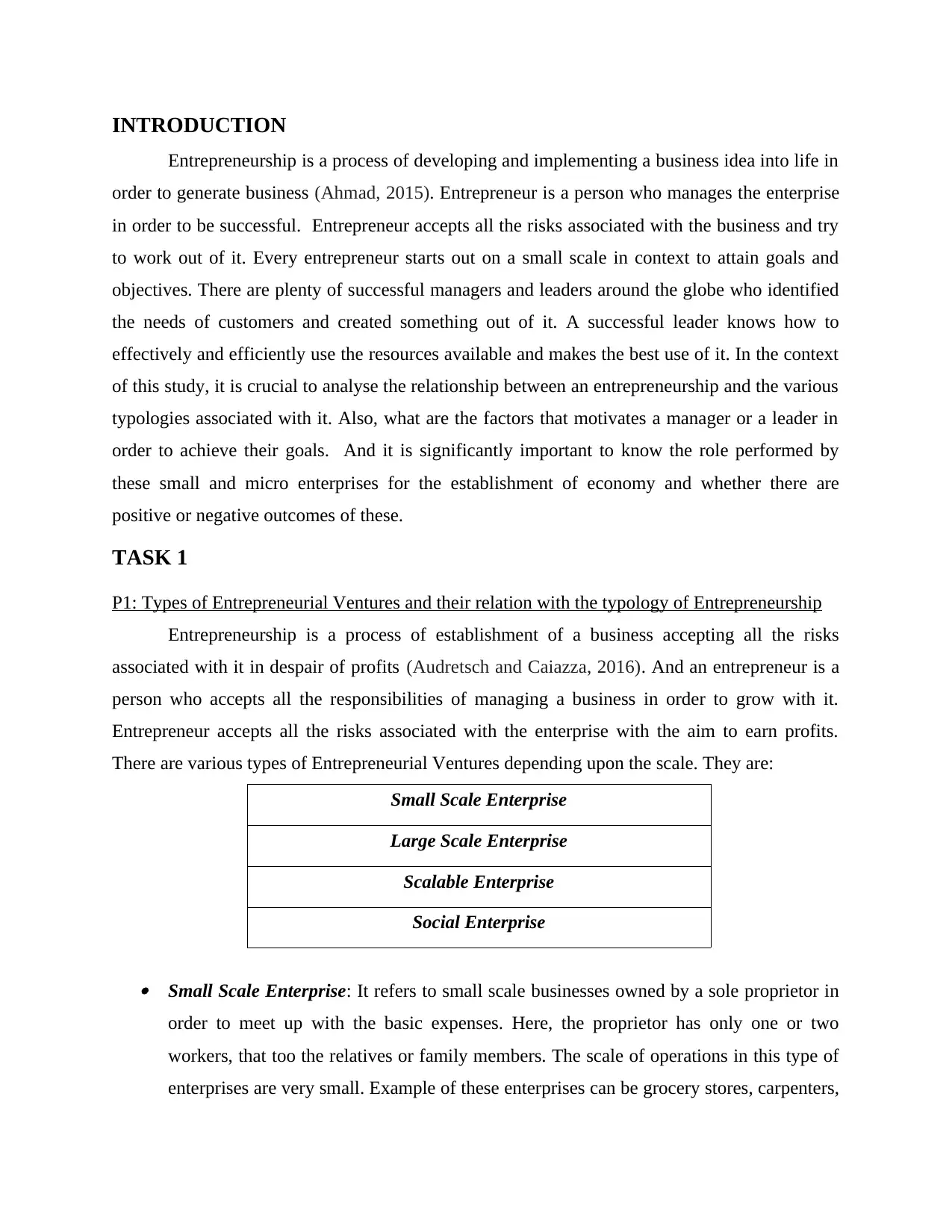
INTRODUCTION
Entrepreneurship is a process of developing and implementing a business idea into life in
order to generate business (Ahmad, 2015). Entrepreneur is a person who manages the enterprise
in order to be successful. Entrepreneur accepts all the risks associated with the business and try
to work out of it. Every entrepreneur starts out on a small scale in context to attain goals and
objectives. There are plenty of successful managers and leaders around the globe who identified
the needs of customers and created something out of it. A successful leader knows how to
effectively and efficiently use the resources available and makes the best use of it. In the context
of this study, it is crucial to analyse the relationship between an entrepreneurship and the various
typologies associated with it. Also, what are the factors that motivates a manager or a leader in
order to achieve their goals. And it is significantly important to know the role performed by
these small and micro enterprises for the establishment of economy and whether there are
positive or negative outcomes of these.
TASK 1
P1: Types of Entrepreneurial Ventures and their relation with the typology of Entrepreneurship
Entrepreneurship is a process of establishment of a business accepting all the risks
associated with it in despair of profits (Audretsch and Caiazza, 2016). And an entrepreneur is a
person who accepts all the responsibilities of managing a business in order to grow with it.
Entrepreneur accepts all the risks associated with the enterprise with the aim to earn profits.
There are various types of Entrepreneurial Ventures depending upon the scale. They are:
Small Scale Enterprise
Large Scale Enterprise
Scalable Enterprise
Social Enterprise
Small Scale Enterprise: It refers to small scale businesses owned by a sole proprietor in
order to meet up with the basic expenses. Here, the proprietor has only one or two
workers, that too the relatives or family members. The scale of operations in this type of
enterprises are very small. Example of these enterprises can be grocery stores, carpenters,
Entrepreneurship is a process of developing and implementing a business idea into life in
order to generate business (Ahmad, 2015). Entrepreneur is a person who manages the enterprise
in order to be successful. Entrepreneur accepts all the risks associated with the business and try
to work out of it. Every entrepreneur starts out on a small scale in context to attain goals and
objectives. There are plenty of successful managers and leaders around the globe who identified
the needs of customers and created something out of it. A successful leader knows how to
effectively and efficiently use the resources available and makes the best use of it. In the context
of this study, it is crucial to analyse the relationship between an entrepreneurship and the various
typologies associated with it. Also, what are the factors that motivates a manager or a leader in
order to achieve their goals. And it is significantly important to know the role performed by
these small and micro enterprises for the establishment of economy and whether there are
positive or negative outcomes of these.
TASK 1
P1: Types of Entrepreneurial Ventures and their relation with the typology of Entrepreneurship
Entrepreneurship is a process of establishment of a business accepting all the risks
associated with it in despair of profits (Audretsch and Caiazza, 2016). And an entrepreneur is a
person who accepts all the responsibilities of managing a business in order to grow with it.
Entrepreneur accepts all the risks associated with the enterprise with the aim to earn profits.
There are various types of Entrepreneurial Ventures depending upon the scale. They are:
Small Scale Enterprise
Large Scale Enterprise
Scalable Enterprise
Social Enterprise
Small Scale Enterprise: It refers to small scale businesses owned by a sole proprietor in
order to meet up with the basic expenses. Here, the proprietor has only one or two
workers, that too the relatives or family members. The scale of operations in this type of
enterprises are very small. Example of these enterprises can be grocery stores, carpenters,
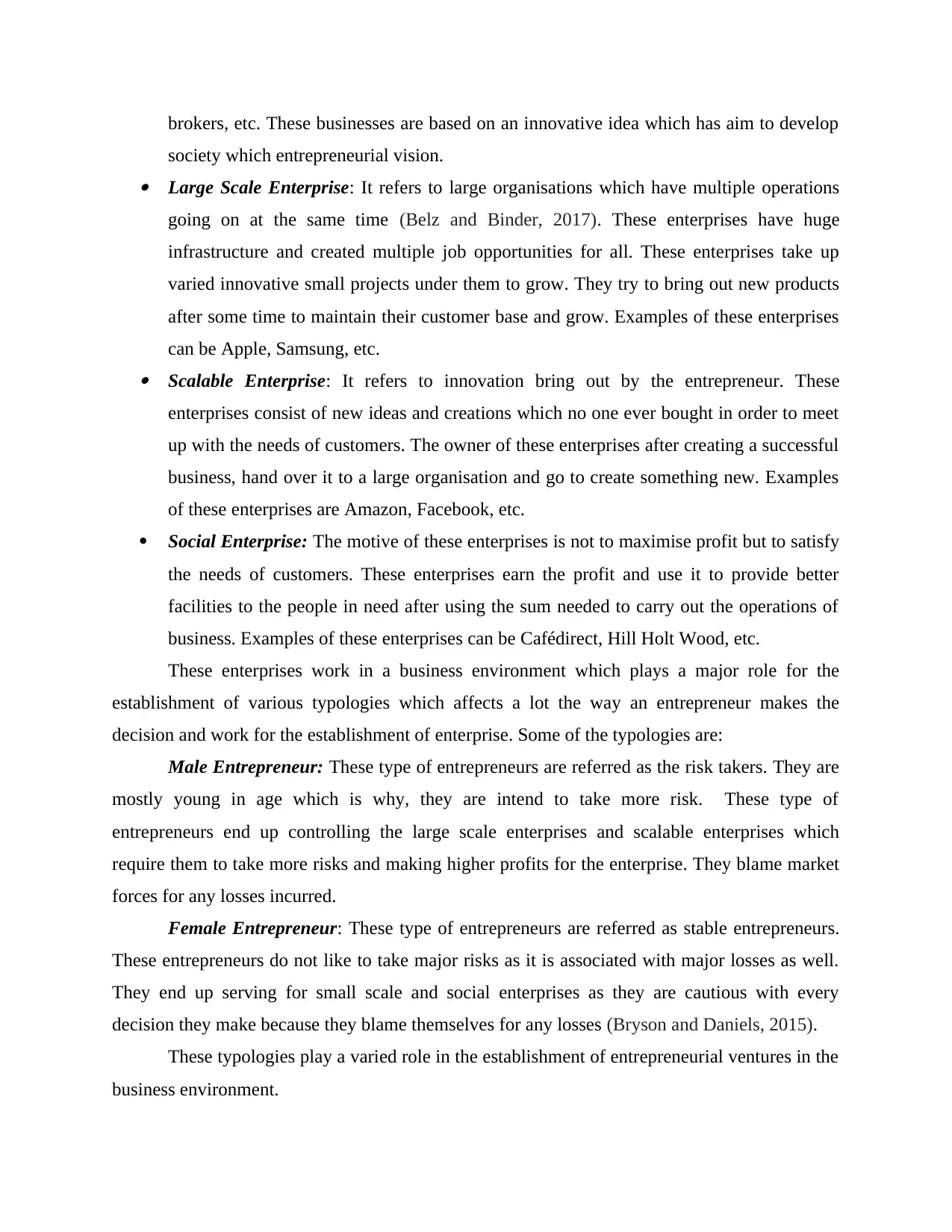
brokers, etc. These businesses are based on an innovative idea which has aim to develop
society which entrepreneurial vision. Large Scale Enterprise: It refers to large organisations which have multiple operations
going on at the same time (Belz and Binder, 2017). These enterprises have huge
infrastructure and created multiple job opportunities for all. These enterprises take up
varied innovative small projects under them to grow. They try to bring out new products
after some time to maintain their customer base and grow. Examples of these enterprises
can be Apple, Samsung, etc. Scalable Enterprise: It refers to innovation bring out by the entrepreneur. These
enterprises consist of new ideas and creations which no one ever bought in order to meet
up with the needs of customers. The owner of these enterprises after creating a successful
business, hand over it to a large organisation and go to create something new. Examples
of these enterprises are Amazon, Facebook, etc.
Social Enterprise: The motive of these enterprises is not to maximise profit but to satisfy
the needs of customers. These enterprises earn the profit and use it to provide better
facilities to the people in need after using the sum needed to carry out the operations of
business. Examples of these enterprises can be Cafédirect, Hill Holt Wood, etc.
These enterprises work in a business environment which plays a major role for the
establishment of various typologies which affects a lot the way an entrepreneur makes the
decision and work for the establishment of enterprise. Some of the typologies are:
Male Entrepreneur: These type of entrepreneurs are referred as the risk takers. They are
mostly young in age which is why, they are intend to take more risk. These type of
entrepreneurs end up controlling the large scale enterprises and scalable enterprises which
require them to take more risks and making higher profits for the enterprise. They blame market
forces for any losses incurred.
Female Entrepreneur: These type of entrepreneurs are referred as stable entrepreneurs.
These entrepreneurs do not like to take major risks as it is associated with major losses as well.
They end up serving for small scale and social enterprises as they are cautious with every
decision they make because they blame themselves for any losses (Bryson and Daniels, 2015).
These typologies play a varied role in the establishment of entrepreneurial ventures in the
business environment.
society which entrepreneurial vision. Large Scale Enterprise: It refers to large organisations which have multiple operations
going on at the same time (Belz and Binder, 2017). These enterprises have huge
infrastructure and created multiple job opportunities for all. These enterprises take up
varied innovative small projects under them to grow. They try to bring out new products
after some time to maintain their customer base and grow. Examples of these enterprises
can be Apple, Samsung, etc. Scalable Enterprise: It refers to innovation bring out by the entrepreneur. These
enterprises consist of new ideas and creations which no one ever bought in order to meet
up with the needs of customers. The owner of these enterprises after creating a successful
business, hand over it to a large organisation and go to create something new. Examples
of these enterprises are Amazon, Facebook, etc.
Social Enterprise: The motive of these enterprises is not to maximise profit but to satisfy
the needs of customers. These enterprises earn the profit and use it to provide better
facilities to the people in need after using the sum needed to carry out the operations of
business. Examples of these enterprises can be Cafédirect, Hill Holt Wood, etc.
These enterprises work in a business environment which plays a major role for the
establishment of various typologies which affects a lot the way an entrepreneur makes the
decision and work for the establishment of enterprise. Some of the typologies are:
Male Entrepreneur: These type of entrepreneurs are referred as the risk takers. They are
mostly young in age which is why, they are intend to take more risk. These type of
entrepreneurs end up controlling the large scale enterprises and scalable enterprises which
require them to take more risks and making higher profits for the enterprise. They blame market
forces for any losses incurred.
Female Entrepreneur: These type of entrepreneurs are referred as stable entrepreneurs.
These entrepreneurs do not like to take major risks as it is associated with major losses as well.
They end up serving for small scale and social enterprises as they are cautious with every
decision they make because they blame themselves for any losses (Bryson and Daniels, 2015).
These typologies play a varied role in the establishment of entrepreneurial ventures in the
business environment.
Secure Best Marks with AI Grader
Need help grading? Try our AI Grader for instant feedback on your assignments.
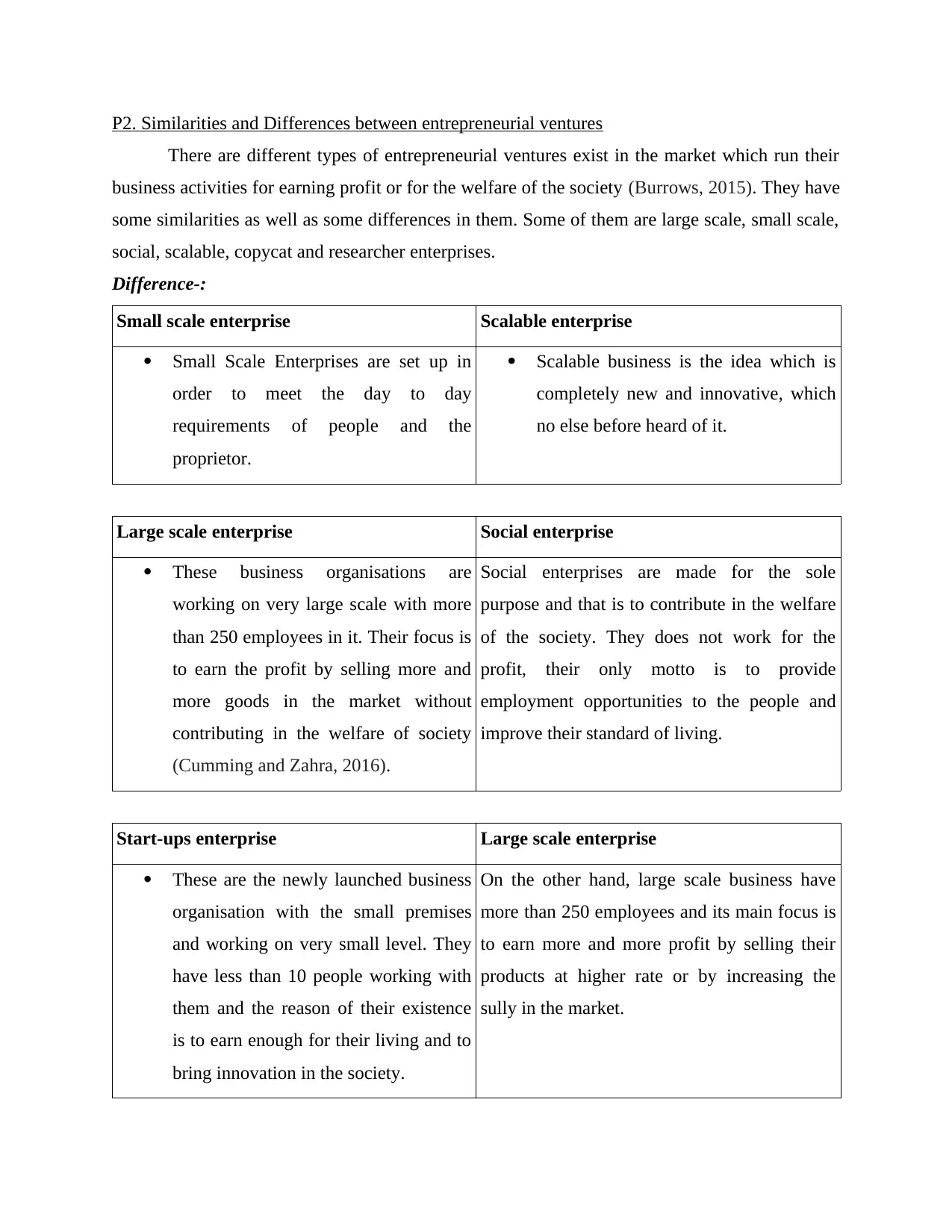
P2. Similarities and Differences between entrepreneurial ventures
There are different types of entrepreneurial ventures exist in the market which run their
business activities for earning profit or for the welfare of the society (Burrows, 2015). They have
some similarities as well as some differences in them. Some of them are large scale, small scale,
social, scalable, copycat and researcher enterprises.
Difference-:
Small scale enterprise Scalable enterprise
Small Scale Enterprises are set up in
order to meet the day to day
requirements of people and the
proprietor.
Scalable business is the idea which is
completely new and innovative, which
no else before heard of it.
Large scale enterprise Social enterprise
These business organisations are
working on very large scale with more
than 250 employees in it. Their focus is
to earn the profit by selling more and
more goods in the market without
contributing in the welfare of society
(Cumming and Zahra, 2016).
Social enterprises are made for the sole
purpose and that is to contribute in the welfare
of the society. They does not work for the
profit, their only motto is to provide
employment opportunities to the people and
improve their standard of living.
Start-ups enterprise Large scale enterprise
These are the newly launched business
organisation with the small premises
and working on very small level. They
have less than 10 people working with
them and the reason of their existence
is to earn enough for their living and to
bring innovation in the society.
On the other hand, large scale business have
more than 250 employees and its main focus is
to earn more and more profit by selling their
products at higher rate or by increasing the
sully in the market.
There are different types of entrepreneurial ventures exist in the market which run their
business activities for earning profit or for the welfare of the society (Burrows, 2015). They have
some similarities as well as some differences in them. Some of them are large scale, small scale,
social, scalable, copycat and researcher enterprises.
Difference-:
Small scale enterprise Scalable enterprise
Small Scale Enterprises are set up in
order to meet the day to day
requirements of people and the
proprietor.
Scalable business is the idea which is
completely new and innovative, which
no else before heard of it.
Large scale enterprise Social enterprise
These business organisations are
working on very large scale with more
than 250 employees in it. Their focus is
to earn the profit by selling more and
more goods in the market without
contributing in the welfare of society
(Cumming and Zahra, 2016).
Social enterprises are made for the sole
purpose and that is to contribute in the welfare
of the society. They does not work for the
profit, their only motto is to provide
employment opportunities to the people and
improve their standard of living.
Start-ups enterprise Large scale enterprise
These are the newly launched business
organisation with the small premises
and working on very small level. They
have less than 10 people working with
them and the reason of their existence
is to earn enough for their living and to
bring innovation in the society.
On the other hand, large scale business have
more than 250 employees and its main focus is
to earn more and more profit by selling their
products at higher rate or by increasing the
sully in the market.
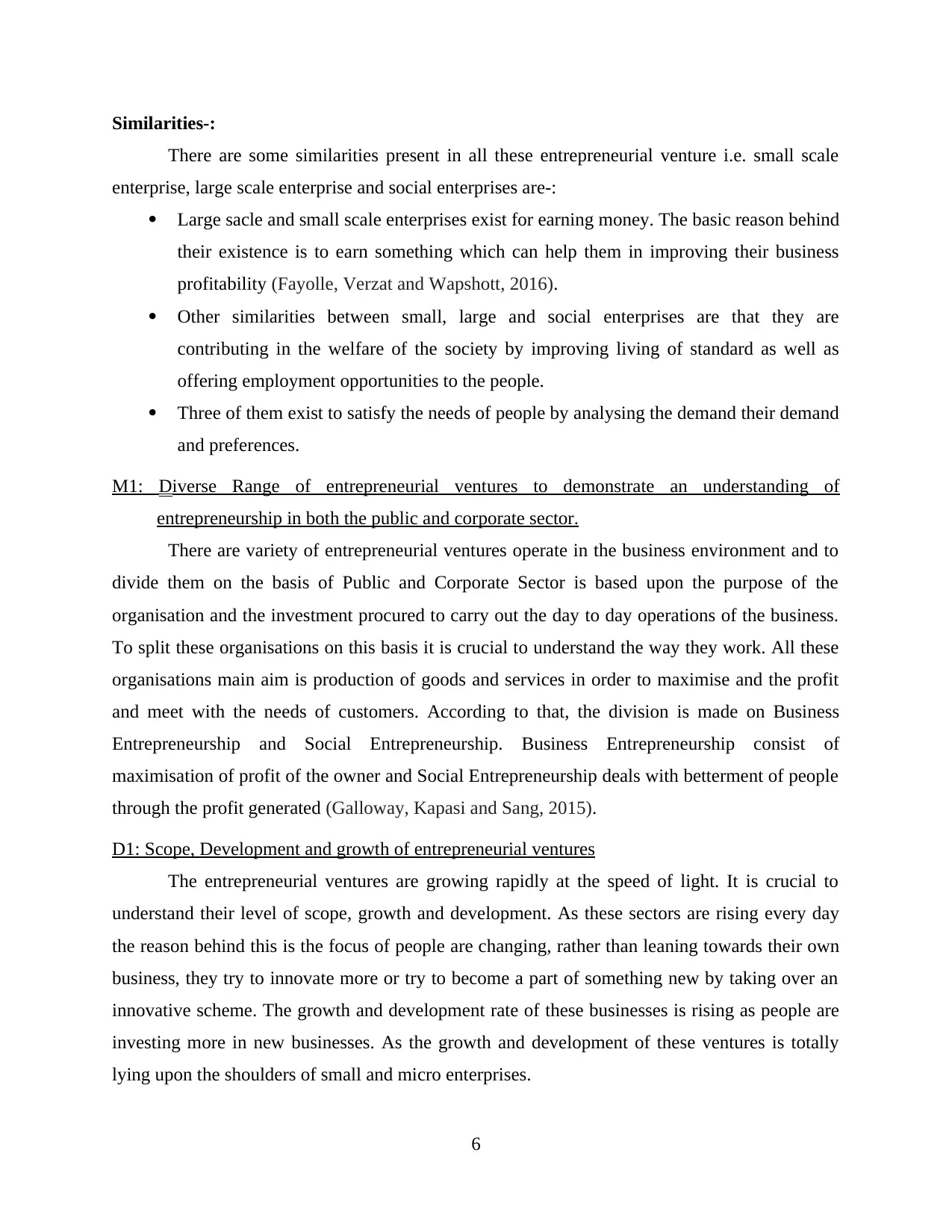
Similarities-:
There are some similarities present in all these entrepreneurial venture i.e. small scale
enterprise, large scale enterprise and social enterprises are-:
Large sacle and small scale enterprises exist for earning money. The basic reason behind
their existence is to earn something which can help them in improving their business
profitability (Fayolle, Verzat and Wapshott, 2016).
Other similarities between small, large and social enterprises are that they are
contributing in the welfare of the society by improving living of standard as well as
offering employment opportunities to the people.
Three of them exist to satisfy the needs of people by analysing the demand their demand
and preferences.
M1: Diverse Range of entrepreneurial ventures to demonstrate an understanding of
entrepreneurship in both the public and corporate sector.
There are variety of entrepreneurial ventures operate in the business environment and to
divide them on the basis of Public and Corporate Sector is based upon the purpose of the
organisation and the investment procured to carry out the day to day operations of the business.
To split these organisations on this basis it is crucial to understand the way they work. All these
organisations main aim is production of goods and services in order to maximise and the profit
and meet with the needs of customers. According to that, the division is made on Business
Entrepreneurship and Social Entrepreneurship. Business Entrepreneurship consist of
maximisation of profit of the owner and Social Entrepreneurship deals with betterment of people
through the profit generated (Galloway, Kapasi and Sang, 2015).
D1: Scope, Development and growth of entrepreneurial ventures
The entrepreneurial ventures are growing rapidly at the speed of light. It is crucial to
understand their level of scope, growth and development. As these sectors are rising every day
the reason behind this is the focus of people are changing, rather than leaning towards their own
business, they try to innovate more or try to become a part of something new by taking over an
innovative scheme. The growth and development rate of these businesses is rising as people are
investing more in new businesses. As the growth and development of these ventures is totally
lying upon the shoulders of small and micro enterprises.
6
There are some similarities present in all these entrepreneurial venture i.e. small scale
enterprise, large scale enterprise and social enterprises are-:
Large sacle and small scale enterprises exist for earning money. The basic reason behind
their existence is to earn something which can help them in improving their business
profitability (Fayolle, Verzat and Wapshott, 2016).
Other similarities between small, large and social enterprises are that they are
contributing in the welfare of the society by improving living of standard as well as
offering employment opportunities to the people.
Three of them exist to satisfy the needs of people by analysing the demand their demand
and preferences.
M1: Diverse Range of entrepreneurial ventures to demonstrate an understanding of
entrepreneurship in both the public and corporate sector.
There are variety of entrepreneurial ventures operate in the business environment and to
divide them on the basis of Public and Corporate Sector is based upon the purpose of the
organisation and the investment procured to carry out the day to day operations of the business.
To split these organisations on this basis it is crucial to understand the way they work. All these
organisations main aim is production of goods and services in order to maximise and the profit
and meet with the needs of customers. According to that, the division is made on Business
Entrepreneurship and Social Entrepreneurship. Business Entrepreneurship consist of
maximisation of profit of the owner and Social Entrepreneurship deals with betterment of people
through the profit generated (Galloway, Kapasi and Sang, 2015).
D1: Scope, Development and growth of entrepreneurial ventures
The entrepreneurial ventures are growing rapidly at the speed of light. It is crucial to
understand their level of scope, growth and development. As these sectors are rising every day
the reason behind this is the focus of people are changing, rather than leaning towards their own
business, they try to innovate more or try to become a part of something new by taking over an
innovative scheme. The growth and development rate of these businesses is rising as people are
investing more in new businesses. As the growth and development of these ventures is totally
lying upon the shoulders of small and micro enterprises.
6
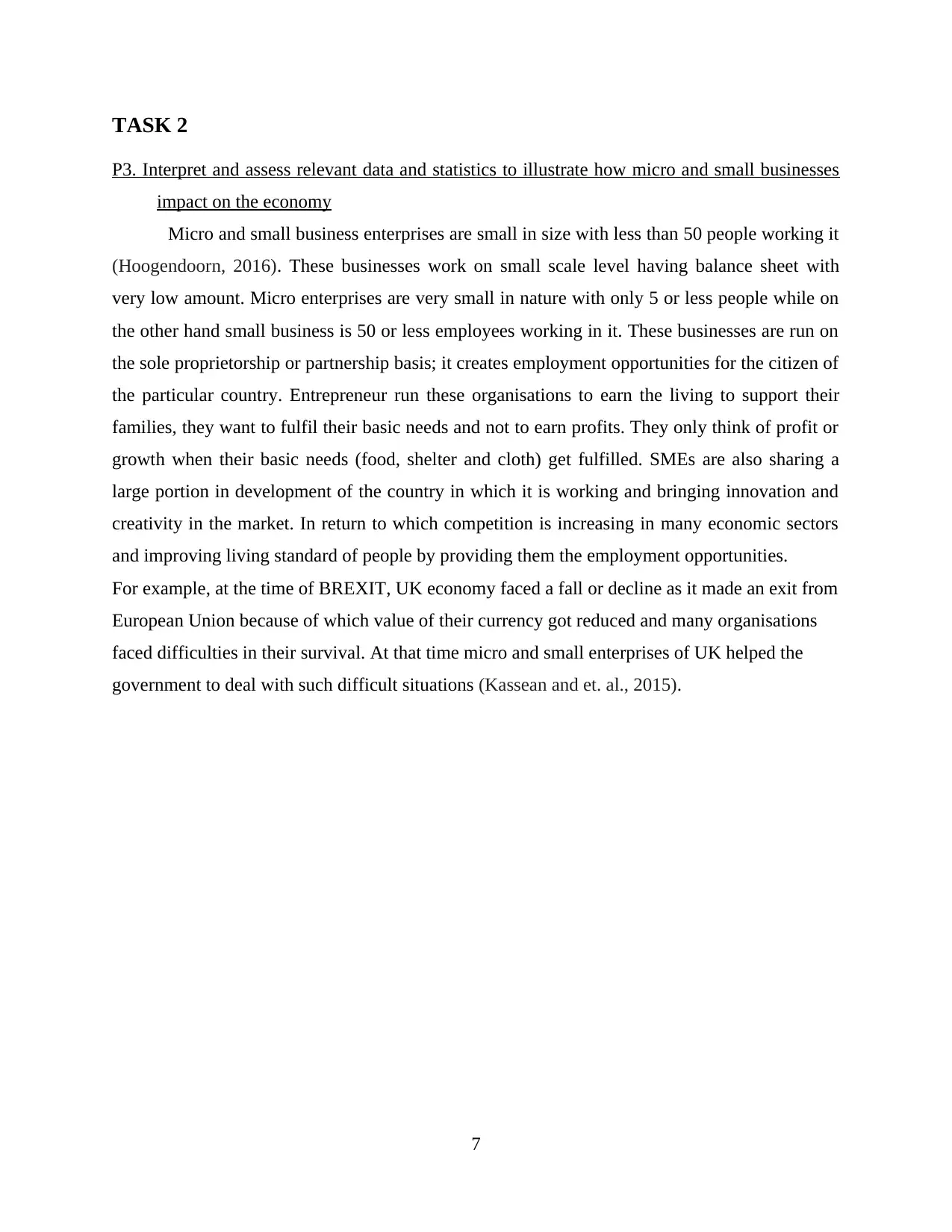
TASK 2
P3. Interpret and assess relevant data and statistics to illustrate how micro and small businesses
impact on the economy
Micro and small business enterprises are small in size with less than 50 people working it
(Hoogendoorn, 2016). These businesses work on small scale level having balance sheet with
very low amount. Micro enterprises are very small in nature with only 5 or less people while on
the other hand small business is 50 or less employees working in it. These businesses are run on
the sole proprietorship or partnership basis; it creates employment opportunities for the citizen of
the particular country. Entrepreneur run these organisations to earn the living to support their
families, they want to fulfil their basic needs and not to earn profits. They only think of profit or
growth when their basic needs (food, shelter and cloth) get fulfilled. SMEs are also sharing a
large portion in development of the country in which it is working and bringing innovation and
creativity in the market. In return to which competition is increasing in many economic sectors
and improving living standard of people by providing them the employment opportunities.
For example, at the time of BREXIT, UK economy faced a fall or decline as it made an exit from
European Union because of which value of their currency got reduced and many organisations
faced difficulties in their survival. At that time micro and small enterprises of UK helped the
government to deal with such difficult situations (Kassean and et. al., 2015).
7
P3. Interpret and assess relevant data and statistics to illustrate how micro and small businesses
impact on the economy
Micro and small business enterprises are small in size with less than 50 people working it
(Hoogendoorn, 2016). These businesses work on small scale level having balance sheet with
very low amount. Micro enterprises are very small in nature with only 5 or less people while on
the other hand small business is 50 or less employees working in it. These businesses are run on
the sole proprietorship or partnership basis; it creates employment opportunities for the citizen of
the particular country. Entrepreneur run these organisations to earn the living to support their
families, they want to fulfil their basic needs and not to earn profits. They only think of profit or
growth when their basic needs (food, shelter and cloth) get fulfilled. SMEs are also sharing a
large portion in development of the country in which it is working and bringing innovation and
creativity in the market. In return to which competition is increasing in many economic sectors
and improving living standard of people by providing them the employment opportunities.
For example, at the time of BREXIT, UK economy faced a fall or decline as it made an exit from
European Union because of which value of their currency got reduced and many organisations
faced difficulties in their survival. At that time micro and small enterprises of UK helped the
government to deal with such difficult situations (Kassean and et. al., 2015).
7
Paraphrase This Document
Need a fresh take? Get an instant paraphrase of this document with our AI Paraphraser
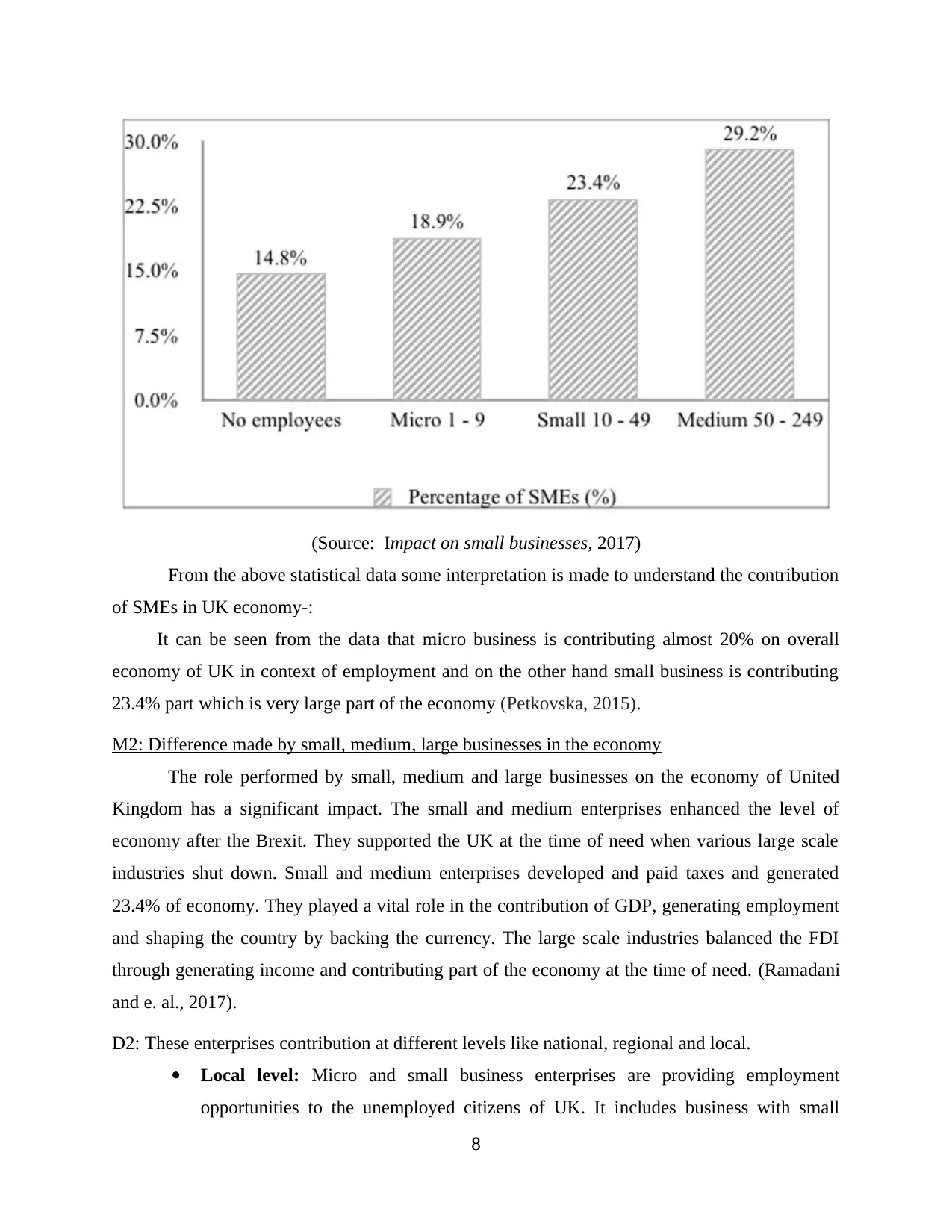
(Source: Impact on small businesses, 2017)
From the above statistical data some interpretation is made to understand the contribution
of SMEs in UK economy-:
It can be seen from the data that micro business is contributing almost 20% on overall
economy of UK in context of employment and on the other hand small business is contributing
23.4% part which is very large part of the economy (Petkovska, 2015).
M2: Difference made by small, medium, large businesses in the economy
The role performed by small, medium and large businesses on the economy of United
Kingdom has a significant impact. The small and medium enterprises enhanced the level of
economy after the Brexit. They supported the UK at the time of need when various large scale
industries shut down. Small and medium enterprises developed and paid taxes and generated
23.4% of economy. They played a vital role in the contribution of GDP, generating employment
and shaping the country by backing the currency. The large scale industries balanced the FDI
through generating income and contributing part of the economy at the time of need. (Ramadani
and e. al., 2017).
D2: These enterprises contribution at different levels like national, regional and local.
Local level: Micro and small business enterprises are providing employment
opportunities to the unemployed citizens of UK. It includes business with small
8
From the above statistical data some interpretation is made to understand the contribution
of SMEs in UK economy-:
It can be seen from the data that micro business is contributing almost 20% on overall
economy of UK in context of employment and on the other hand small business is contributing
23.4% part which is very large part of the economy (Petkovska, 2015).
M2: Difference made by small, medium, large businesses in the economy
The role performed by small, medium and large businesses on the economy of United
Kingdom has a significant impact. The small and medium enterprises enhanced the level of
economy after the Brexit. They supported the UK at the time of need when various large scale
industries shut down. Small and medium enterprises developed and paid taxes and generated
23.4% of economy. They played a vital role in the contribution of GDP, generating employment
and shaping the country by backing the currency. The large scale industries balanced the FDI
through generating income and contributing part of the economy at the time of need. (Ramadani
and e. al., 2017).
D2: These enterprises contribution at different levels like national, regional and local.
Local level: Micro and small business enterprises are providing employment
opportunities to the unemployed citizens of UK. It includes business with small
8
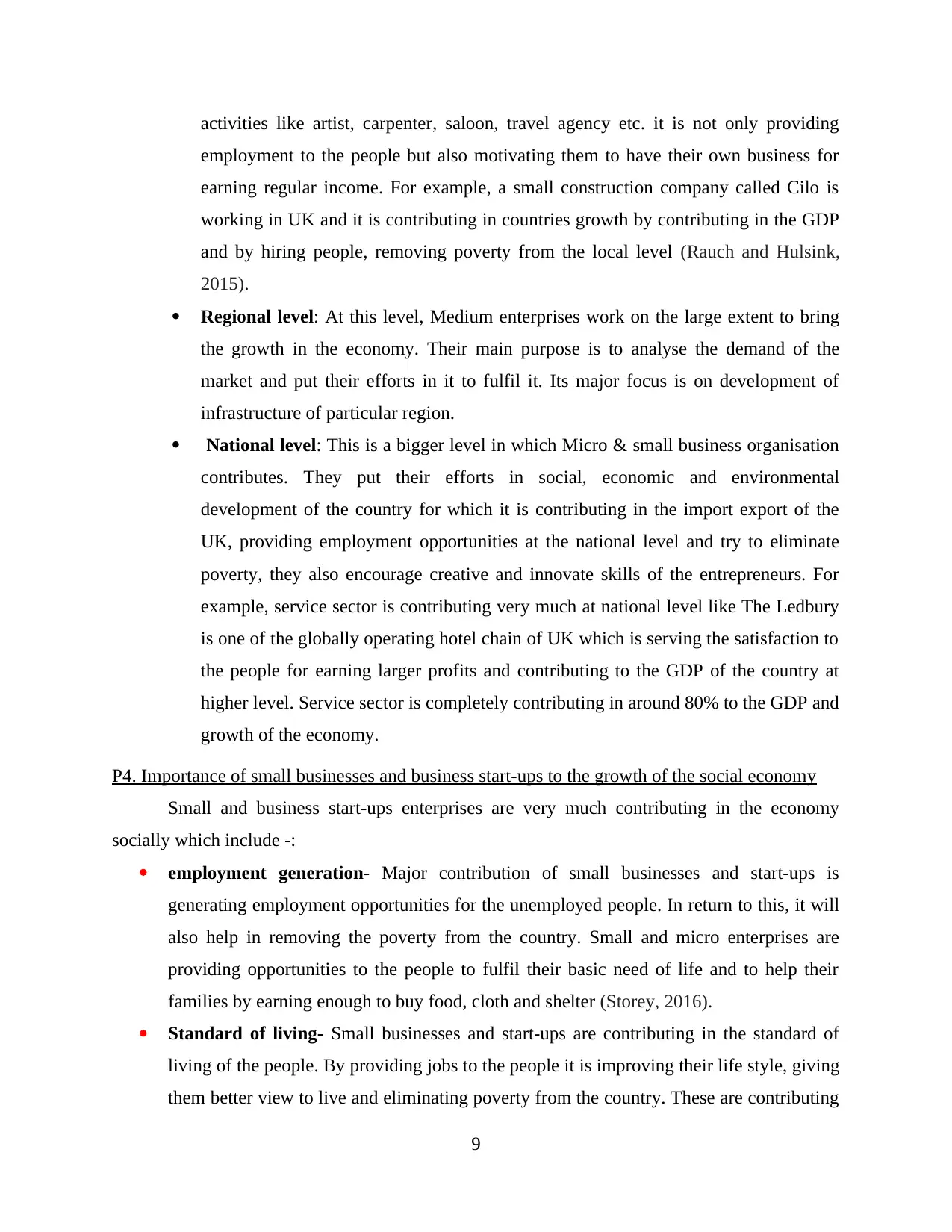
activities like artist, carpenter, saloon, travel agency etc. it is not only providing
employment to the people but also motivating them to have their own business for
earning regular income. For example, a small construction company called Cilo is
working in UK and it is contributing in countries growth by contributing in the GDP
and by hiring people, removing poverty from the local level (Rauch and Hulsink,
2015).
Regional level: At this level, Medium enterprises work on the large extent to bring
the growth in the economy. Their main purpose is to analyse the demand of the
market and put their efforts in it to fulfil it. Its major focus is on development of
infrastructure of particular region.
National level: This is a bigger level in which Micro & small business organisation
contributes. They put their efforts in social, economic and environmental
development of the country for which it is contributing in the import export of the
UK, providing employment opportunities at the national level and try to eliminate
poverty, they also encourage creative and innovate skills of the entrepreneurs. For
example, service sector is contributing very much at national level like The Ledbury
is one of the globally operating hotel chain of UK which is serving the satisfaction to
the people for earning larger profits and contributing to the GDP of the country at
higher level. Service sector is completely contributing in around 80% to the GDP and
growth of the economy.
P4. Importance of small businesses and business start-ups to the growth of the social economy
Small and business start-ups enterprises are very much contributing in the economy
socially which include -:
employment generation- Major contribution of small businesses and start-ups is
generating employment opportunities for the unemployed people. In return to this, it will
also help in removing the poverty from the country. Small and micro enterprises are
providing opportunities to the people to fulfil their basic need of life and to help their
families by earning enough to buy food, cloth and shelter (Storey, 2016).
Standard of living- Small businesses and start-ups are contributing in the standard of
living of the people. By providing jobs to the people it is improving their life style, giving
them better view to live and eliminating poverty from the country. These are contributing
9
employment to the people but also motivating them to have their own business for
earning regular income. For example, a small construction company called Cilo is
working in UK and it is contributing in countries growth by contributing in the GDP
and by hiring people, removing poverty from the local level (Rauch and Hulsink,
2015).
Regional level: At this level, Medium enterprises work on the large extent to bring
the growth in the economy. Their main purpose is to analyse the demand of the
market and put their efforts in it to fulfil it. Its major focus is on development of
infrastructure of particular region.
National level: This is a bigger level in which Micro & small business organisation
contributes. They put their efforts in social, economic and environmental
development of the country for which it is contributing in the import export of the
UK, providing employment opportunities at the national level and try to eliminate
poverty, they also encourage creative and innovate skills of the entrepreneurs. For
example, service sector is contributing very much at national level like The Ledbury
is one of the globally operating hotel chain of UK which is serving the satisfaction to
the people for earning larger profits and contributing to the GDP of the country at
higher level. Service sector is completely contributing in around 80% to the GDP and
growth of the economy.
P4. Importance of small businesses and business start-ups to the growth of the social economy
Small and business start-ups enterprises are very much contributing in the economy
socially which include -:
employment generation- Major contribution of small businesses and start-ups is
generating employment opportunities for the unemployed people. In return to this, it will
also help in removing the poverty from the country. Small and micro enterprises are
providing opportunities to the people to fulfil their basic need of life and to help their
families by earning enough to buy food, cloth and shelter (Storey, 2016).
Standard of living- Small businesses and start-ups are contributing in the standard of
living of the people. By providing jobs to the people it is improving their life style, giving
them better view to live and eliminating poverty from the country. These are contributing
9
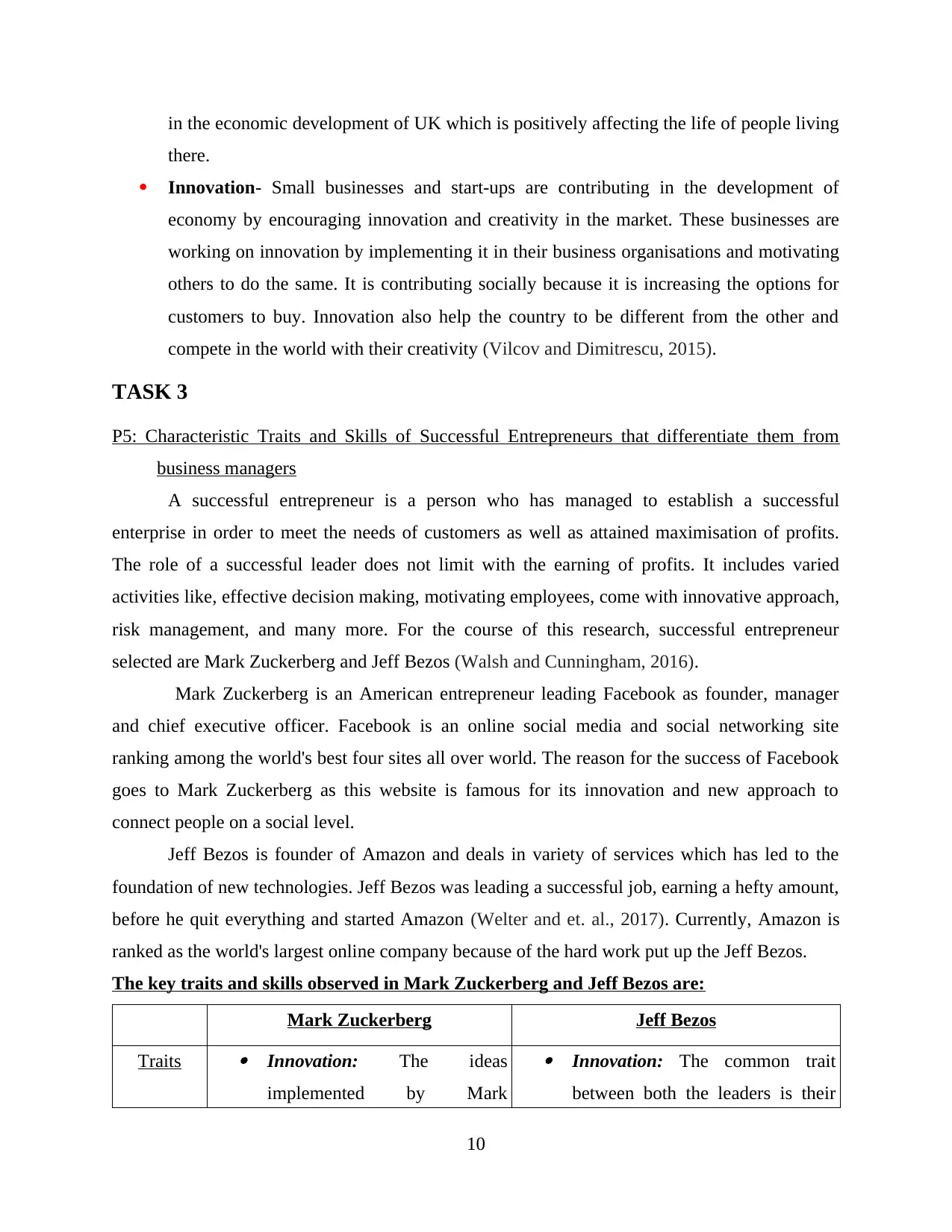
in the economic development of UK which is positively affecting the life of people living
there.
Innovation- Small businesses and start-ups are contributing in the development of
economy by encouraging innovation and creativity in the market. These businesses are
working on innovation by implementing it in their business organisations and motivating
others to do the same. It is contributing socially because it is increasing the options for
customers to buy. Innovation also help the country to be different from the other and
compete in the world with their creativity (Vilcov and Dimitrescu, 2015).
TASK 3
P5: Characteristic Traits and Skills of Successful Entrepreneurs that differentiate them from
business managers
A successful entrepreneur is a person who has managed to establish a successful
enterprise in order to meet the needs of customers as well as attained maximisation of profits.
The role of a successful leader does not limit with the earning of profits. It includes varied
activities like, effective decision making, motivating employees, come with innovative approach,
risk management, and many more. For the course of this research, successful entrepreneur
selected are Mark Zuckerberg and Jeff Bezos (Walsh and Cunningham, 2016).
Mark Zuckerberg is an American entrepreneur leading Facebook as founder, manager
and chief executive officer. Facebook is an online social media and social networking site
ranking among the world's best four sites all over world. The reason for the success of Facebook
goes to Mark Zuckerberg as this website is famous for its innovation and new approach to
connect people on a social level.
Jeff Bezos is founder of Amazon and deals in variety of services which has led to the
foundation of new technologies. Jeff Bezos was leading a successful job, earning a hefty amount,
before he quit everything and started Amazon (Welter and et. al., 2017). Currently, Amazon is
ranked as the world's largest online company because of the hard work put up the Jeff Bezos.
The key traits and skills observed in Mark Zuckerberg and Jeff Bezos are:
Mark Zuckerberg Jeff Bezos
Traits
Innovation: The ideas
implemented by Mark
Innovation: The common trait
between both the leaders is their
10
there.
Innovation- Small businesses and start-ups are contributing in the development of
economy by encouraging innovation and creativity in the market. These businesses are
working on innovation by implementing it in their business organisations and motivating
others to do the same. It is contributing socially because it is increasing the options for
customers to buy. Innovation also help the country to be different from the other and
compete in the world with their creativity (Vilcov and Dimitrescu, 2015).
TASK 3
P5: Characteristic Traits and Skills of Successful Entrepreneurs that differentiate them from
business managers
A successful entrepreneur is a person who has managed to establish a successful
enterprise in order to meet the needs of customers as well as attained maximisation of profits.
The role of a successful leader does not limit with the earning of profits. It includes varied
activities like, effective decision making, motivating employees, come with innovative approach,
risk management, and many more. For the course of this research, successful entrepreneur
selected are Mark Zuckerberg and Jeff Bezos (Walsh and Cunningham, 2016).
Mark Zuckerberg is an American entrepreneur leading Facebook as founder, manager
and chief executive officer. Facebook is an online social media and social networking site
ranking among the world's best four sites all over world. The reason for the success of Facebook
goes to Mark Zuckerberg as this website is famous for its innovation and new approach to
connect people on a social level.
Jeff Bezos is founder of Amazon and deals in variety of services which has led to the
foundation of new technologies. Jeff Bezos was leading a successful job, earning a hefty amount,
before he quit everything and started Amazon (Welter and et. al., 2017). Currently, Amazon is
ranked as the world's largest online company because of the hard work put up the Jeff Bezos.
The key traits and skills observed in Mark Zuckerberg and Jeff Bezos are:
Mark Zuckerberg Jeff Bezos
Traits
Innovation: The ideas
implemented by Mark
Innovation: The common trait
between both the leaders is their
10
Secure Best Marks with AI Grader
Need help grading? Try our AI Grader for instant feedback on your assignments.
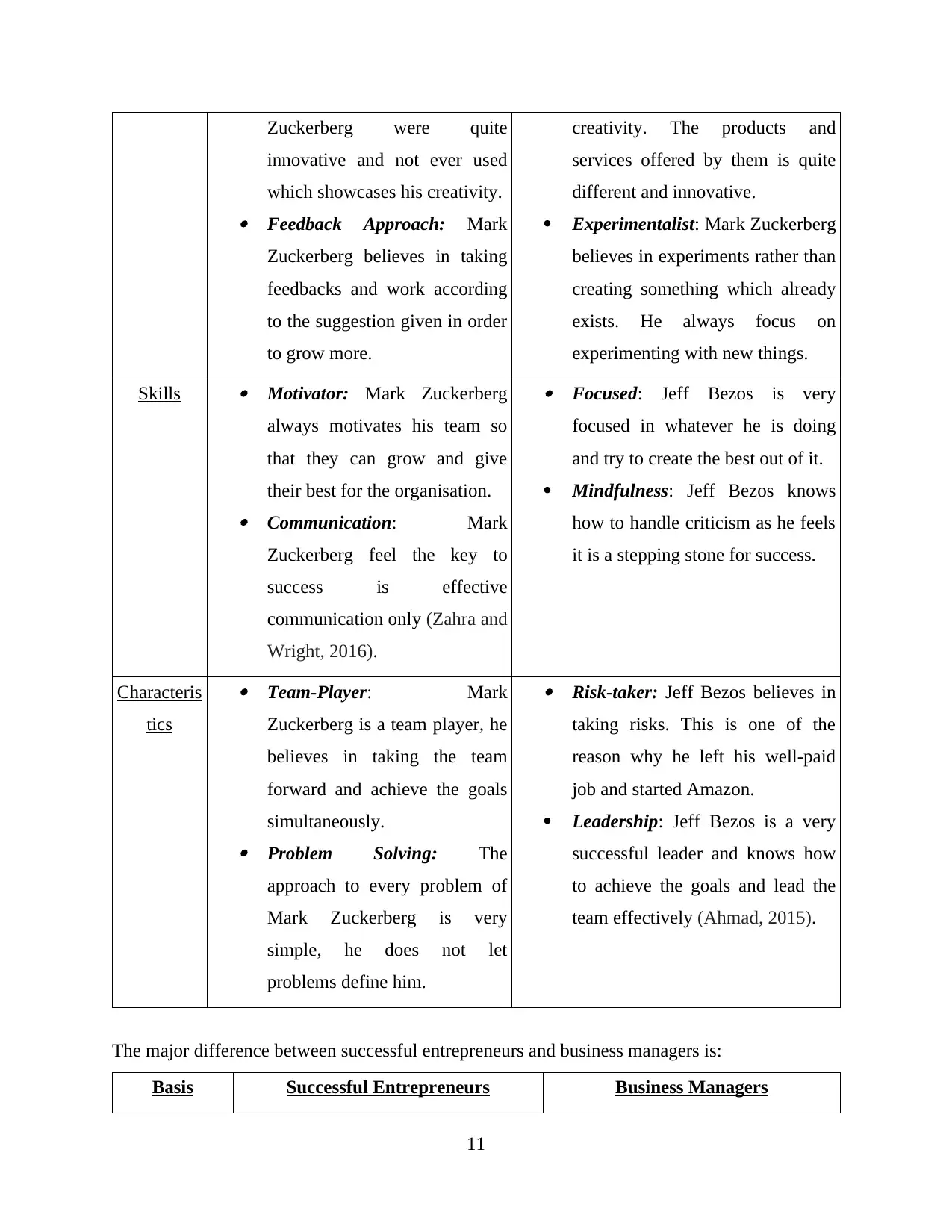
Zuckerberg were quite
innovative and not ever used
which showcases his creativity.
Feedback Approach: Mark
Zuckerberg believes in taking
feedbacks and work according
to the suggestion given in order
to grow more.
creativity. The products and
services offered by them is quite
different and innovative.
Experimentalist: Mark Zuckerberg
believes in experiments rather than
creating something which already
exists. He always focus on
experimenting with new things.
Skills
Motivator: Mark Zuckerberg
always motivates his team so
that they can grow and give
their best for the organisation.
Communication: Mark
Zuckerberg feel the key to
success is effective
communication only (Zahra and
Wright, 2016).
Focused: Jeff Bezos is very
focused in whatever he is doing
and try to create the best out of it.
Mindfulness: Jeff Bezos knows
how to handle criticism as he feels
it is a stepping stone for success.
Characteris
tics
Team-Player: Mark
Zuckerberg is a team player, he
believes in taking the team
forward and achieve the goals
simultaneously.
Problem Solving: The
approach to every problem of
Mark Zuckerberg is very
simple, he does not let
problems define him.
Risk-taker: Jeff Bezos believes in
taking risks. This is one of the
reason why he left his well-paid
job and started Amazon.
Leadership: Jeff Bezos is a very
successful leader and knows how
to achieve the goals and lead the
team effectively (Ahmad, 2015).
The major difference between successful entrepreneurs and business managers is:
Basis Successful Entrepreneurs Business Managers
11
innovative and not ever used
which showcases his creativity.
Feedback Approach: Mark
Zuckerberg believes in taking
feedbacks and work according
to the suggestion given in order
to grow more.
creativity. The products and
services offered by them is quite
different and innovative.
Experimentalist: Mark Zuckerberg
believes in experiments rather than
creating something which already
exists. He always focus on
experimenting with new things.
Skills
Motivator: Mark Zuckerberg
always motivates his team so
that they can grow and give
their best for the organisation.
Communication: Mark
Zuckerberg feel the key to
success is effective
communication only (Zahra and
Wright, 2016).
Focused: Jeff Bezos is very
focused in whatever he is doing
and try to create the best out of it.
Mindfulness: Jeff Bezos knows
how to handle criticism as he feels
it is a stepping stone for success.
Characteris
tics
Team-Player: Mark
Zuckerberg is a team player, he
believes in taking the team
forward and achieve the goals
simultaneously.
Problem Solving: The
approach to every problem of
Mark Zuckerberg is very
simple, he does not let
problems define him.
Risk-taker: Jeff Bezos believes in
taking risks. This is one of the
reason why he left his well-paid
job and started Amazon.
Leadership: Jeff Bezos is a very
successful leader and knows how
to achieve the goals and lead the
team effectively (Ahmad, 2015).
The major difference between successful entrepreneurs and business managers is:
Basis Successful Entrepreneurs Business Managers
11
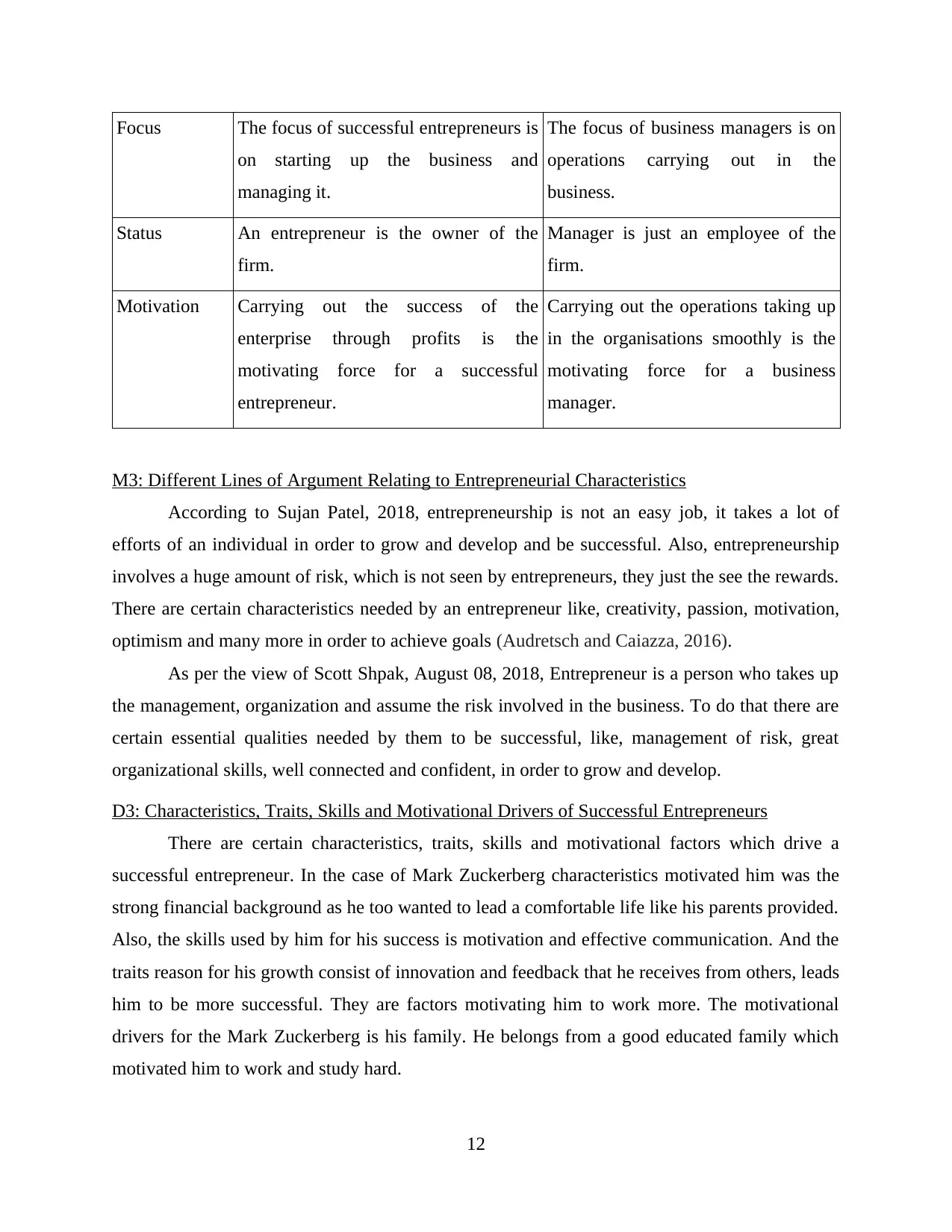
Focus The focus of successful entrepreneurs is
on starting up the business and
managing it.
The focus of business managers is on
operations carrying out in the
business.
Status An entrepreneur is the owner of the
firm.
Manager is just an employee of the
firm.
Motivation Carrying out the success of the
enterprise through profits is the
motivating force for a successful
entrepreneur.
Carrying out the operations taking up
in the organisations smoothly is the
motivating force for a business
manager.
M3: Different Lines of Argument Relating to Entrepreneurial Characteristics
According to Sujan Patel, 2018, entrepreneurship is not an easy job, it takes a lot of
efforts of an individual in order to grow and develop and be successful. Also, entrepreneurship
involves a huge amount of risk, which is not seen by entrepreneurs, they just the see the rewards.
There are certain characteristics needed by an entrepreneur like, creativity, passion, motivation,
optimism and many more in order to achieve goals (Audretsch and Caiazza, 2016).
As per the view of Scott Shpak, August 08, 2018, Entrepreneur is a person who takes up
the management, organization and assume the risk involved in the business. To do that there are
certain essential qualities needed by them to be successful, like, management of risk, great
organizational skills, well connected and confident, in order to grow and develop.
D3: Characteristics, Traits, Skills and Motivational Drivers of Successful Entrepreneurs
There are certain characteristics, traits, skills and motivational factors which drive a
successful entrepreneur. In the case of Mark Zuckerberg characteristics motivated him was the
strong financial background as he too wanted to lead a comfortable life like his parents provided.
Also, the skills used by him for his success is motivation and effective communication. And the
traits reason for his growth consist of innovation and feedback that he receives from others, leads
him to be more successful. They are factors motivating him to work more. The motivational
drivers for the Mark Zuckerberg is his family. He belongs from a good educated family which
motivated him to work and study hard.
12
on starting up the business and
managing it.
The focus of business managers is on
operations carrying out in the
business.
Status An entrepreneur is the owner of the
firm.
Manager is just an employee of the
firm.
Motivation Carrying out the success of the
enterprise through profits is the
motivating force for a successful
entrepreneur.
Carrying out the operations taking up
in the organisations smoothly is the
motivating force for a business
manager.
M3: Different Lines of Argument Relating to Entrepreneurial Characteristics
According to Sujan Patel, 2018, entrepreneurship is not an easy job, it takes a lot of
efforts of an individual in order to grow and develop and be successful. Also, entrepreneurship
involves a huge amount of risk, which is not seen by entrepreneurs, they just the see the rewards.
There are certain characteristics needed by an entrepreneur like, creativity, passion, motivation,
optimism and many more in order to achieve goals (Audretsch and Caiazza, 2016).
As per the view of Scott Shpak, August 08, 2018, Entrepreneur is a person who takes up
the management, organization and assume the risk involved in the business. To do that there are
certain essential qualities needed by them to be successful, like, management of risk, great
organizational skills, well connected and confident, in order to grow and develop.
D3: Characteristics, Traits, Skills and Motivational Drivers of Successful Entrepreneurs
There are certain characteristics, traits, skills and motivational factors which drive a
successful entrepreneur. In the case of Mark Zuckerberg characteristics motivated him was the
strong financial background as he too wanted to lead a comfortable life like his parents provided.
Also, the skills used by him for his success is motivation and effective communication. And the
traits reason for his growth consist of innovation and feedback that he receives from others, leads
him to be more successful. They are factors motivating him to work more. The motivational
drivers for the Mark Zuckerberg is his family. He belongs from a good educated family which
motivated him to work and study hard.
12
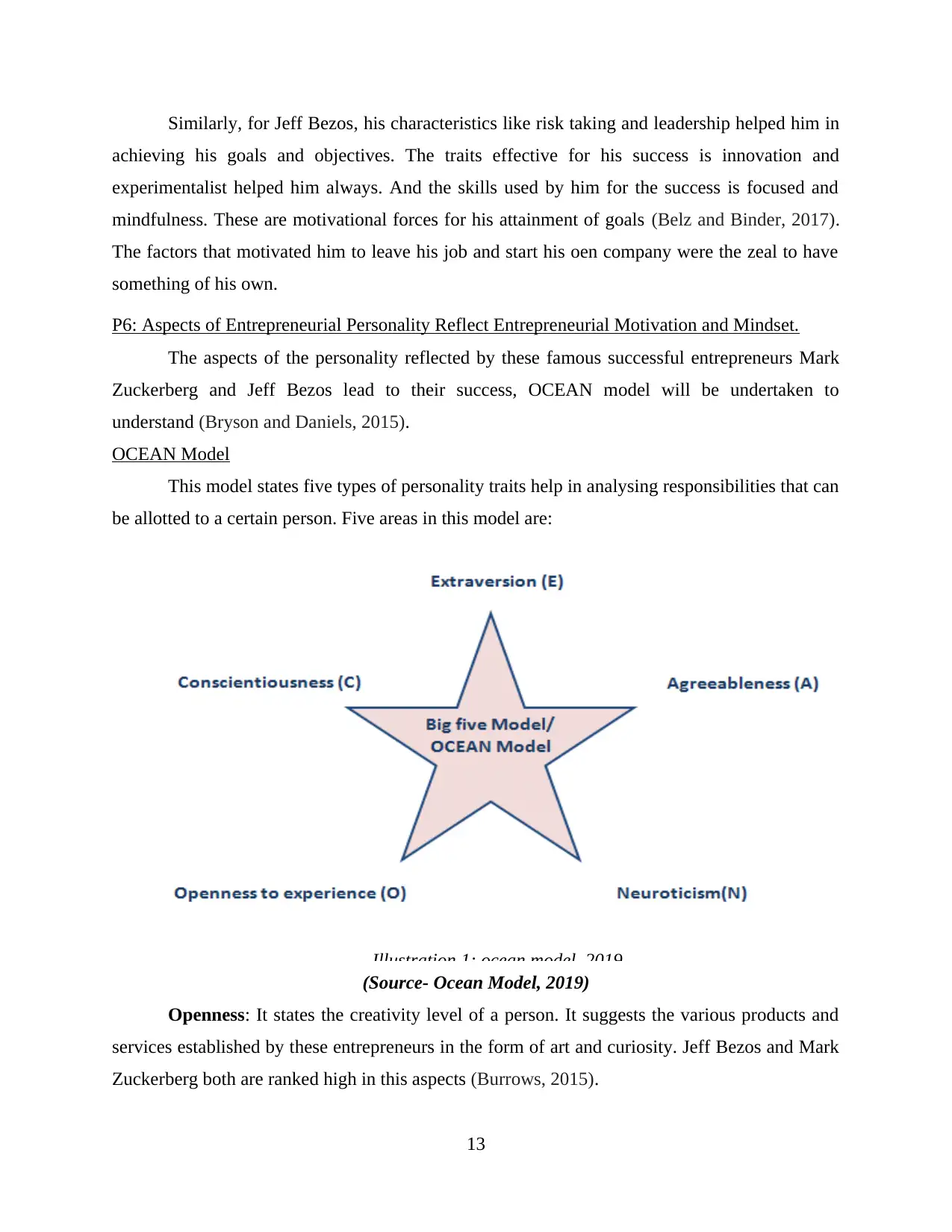
Similarly, for Jeff Bezos, his characteristics like risk taking and leadership helped him in
achieving his goals and objectives. The traits effective for his success is innovation and
experimentalist helped him always. And the skills used by him for the success is focused and
mindfulness. These are motivational forces for his attainment of goals (Belz and Binder, 2017).
The factors that motivated him to leave his job and start his oen company were the zeal to have
something of his own.
P6: Aspects of Entrepreneurial Personality Reflect Entrepreneurial Motivation and Mindset.
The aspects of the personality reflected by these famous successful entrepreneurs Mark
Zuckerberg and Jeff Bezos lead to their success, OCEAN model will be undertaken to
understand (Bryson and Daniels, 2015).
OCEAN Model
This model states five types of personality traits help in analysing responsibilities that can
be allotted to a certain person. Five areas in this model are:
(Source- Ocean Model, 2019)
Openness: It states the creativity level of a person. It suggests the various products and
services established by these entrepreneurs in the form of art and curiosity. Jeff Bezos and Mark
Zuckerberg both are ranked high in this aspects (Burrows, 2015).
13
Illustration 1: ocean model, 2019
achieving his goals and objectives. The traits effective for his success is innovation and
experimentalist helped him always. And the skills used by him for the success is focused and
mindfulness. These are motivational forces for his attainment of goals (Belz and Binder, 2017).
The factors that motivated him to leave his job and start his oen company were the zeal to have
something of his own.
P6: Aspects of Entrepreneurial Personality Reflect Entrepreneurial Motivation and Mindset.
The aspects of the personality reflected by these famous successful entrepreneurs Mark
Zuckerberg and Jeff Bezos lead to their success, OCEAN model will be undertaken to
understand (Bryson and Daniels, 2015).
OCEAN Model
This model states five types of personality traits help in analysing responsibilities that can
be allotted to a certain person. Five areas in this model are:
(Source- Ocean Model, 2019)
Openness: It states the creativity level of a person. It suggests the various products and
services established by these entrepreneurs in the form of art and curiosity. Jeff Bezos and Mark
Zuckerberg both are ranked high in this aspects (Burrows, 2015).
13
Illustration 1: ocean model, 2019
Paraphrase This Document
Need a fresh take? Get an instant paraphrase of this document with our AI Paraphraser
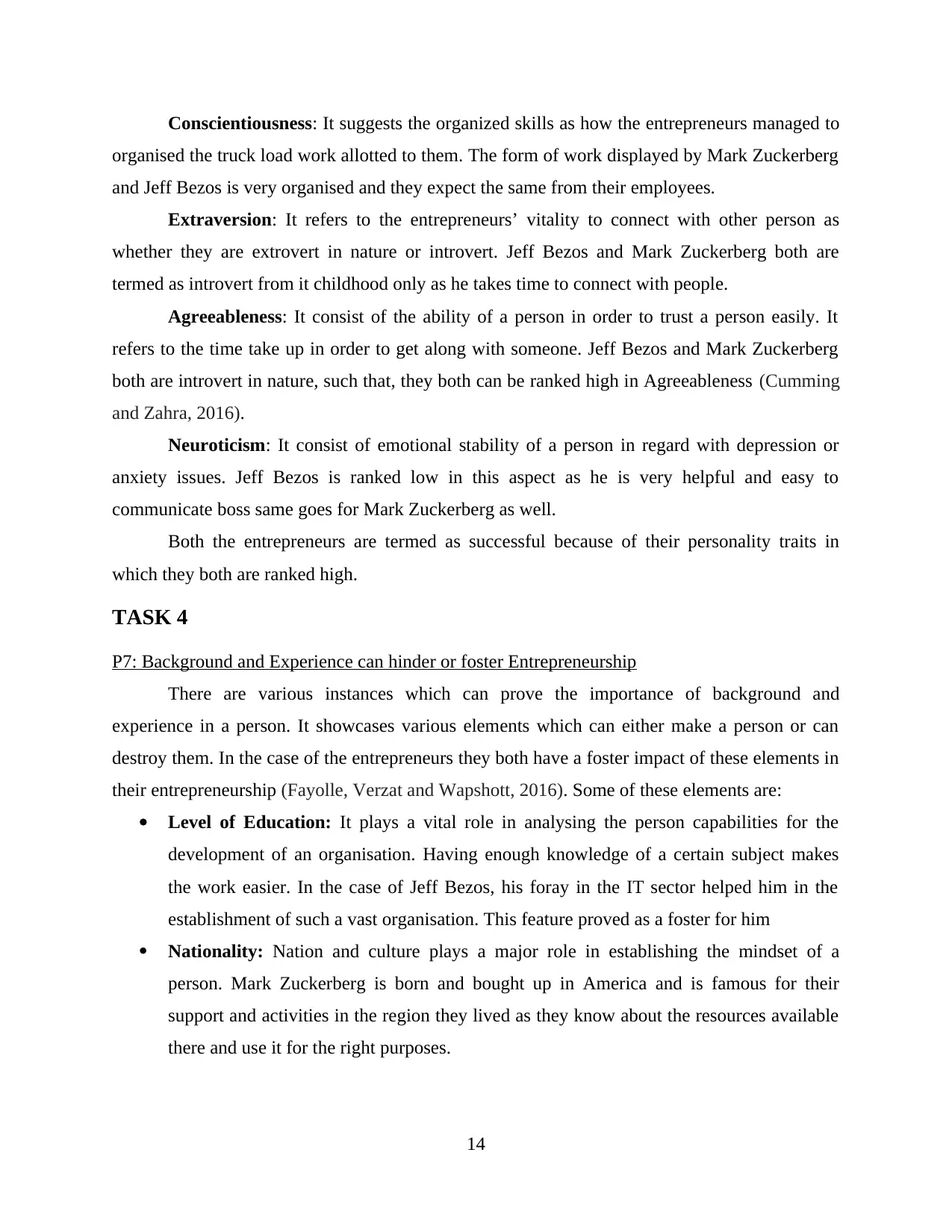
Conscientiousness: It suggests the organized skills as how the entrepreneurs managed to
organised the truck load work allotted to them. The form of work displayed by Mark Zuckerberg
and Jeff Bezos is very organised and they expect the same from their employees.
Extraversion: It refers to the entrepreneurs’ vitality to connect with other person as
whether they are extrovert in nature or introvert. Jeff Bezos and Mark Zuckerberg both are
termed as introvert from it childhood only as he takes time to connect with people.
Agreeableness: It consist of the ability of a person in order to trust a person easily. It
refers to the time take up in order to get along with someone. Jeff Bezos and Mark Zuckerberg
both are introvert in nature, such that, they both can be ranked high in Agreeableness (Cumming
and Zahra, 2016).
Neuroticism: It consist of emotional stability of a person in regard with depression or
anxiety issues. Jeff Bezos is ranked low in this aspect as he is very helpful and easy to
communicate boss same goes for Mark Zuckerberg as well.
Both the entrepreneurs are termed as successful because of their personality traits in
which they both are ranked high.
TASK 4
P7: Background and Experience can hinder or foster Entrepreneurship
There are various instances which can prove the importance of background and
experience in a person. It showcases various elements which can either make a person or can
destroy them. In the case of the entrepreneurs they both have a foster impact of these elements in
their entrepreneurship (Fayolle, Verzat and Wapshott, 2016). Some of these elements are:
Level of Education: It plays a vital role in analysing the person capabilities for the
development of an organisation. Having enough knowledge of a certain subject makes
the work easier. In the case of Jeff Bezos, his foray in the IT sector helped him in the
establishment of such a vast organisation. This feature proved as a foster for him
Nationality: Nation and culture plays a major role in establishing the mindset of a
person. Mark Zuckerberg is born and bought up in America and is famous for their
support and activities in the region they lived as they know about the resources available
there and use it for the right purposes.
14
organised the truck load work allotted to them. The form of work displayed by Mark Zuckerberg
and Jeff Bezos is very organised and they expect the same from their employees.
Extraversion: It refers to the entrepreneurs’ vitality to connect with other person as
whether they are extrovert in nature or introvert. Jeff Bezos and Mark Zuckerberg both are
termed as introvert from it childhood only as he takes time to connect with people.
Agreeableness: It consist of the ability of a person in order to trust a person easily. It
refers to the time take up in order to get along with someone. Jeff Bezos and Mark Zuckerberg
both are introvert in nature, such that, they both can be ranked high in Agreeableness (Cumming
and Zahra, 2016).
Neuroticism: It consist of emotional stability of a person in regard with depression or
anxiety issues. Jeff Bezos is ranked low in this aspect as he is very helpful and easy to
communicate boss same goes for Mark Zuckerberg as well.
Both the entrepreneurs are termed as successful because of their personality traits in
which they both are ranked high.
TASK 4
P7: Background and Experience can hinder or foster Entrepreneurship
There are various instances which can prove the importance of background and
experience in a person. It showcases various elements which can either make a person or can
destroy them. In the case of the entrepreneurs they both have a foster impact of these elements in
their entrepreneurship (Fayolle, Verzat and Wapshott, 2016). Some of these elements are:
Level of Education: It plays a vital role in analysing the person capabilities for the
development of an organisation. Having enough knowledge of a certain subject makes
the work easier. In the case of Jeff Bezos, his foray in the IT sector helped him in the
establishment of such a vast organisation. This feature proved as a foster for him
Nationality: Nation and culture plays a major role in establishing the mindset of a
person. Mark Zuckerberg is born and bought up in America and is famous for their
support and activities in the region they lived as they know about the resources available
there and use it for the right purposes.
14
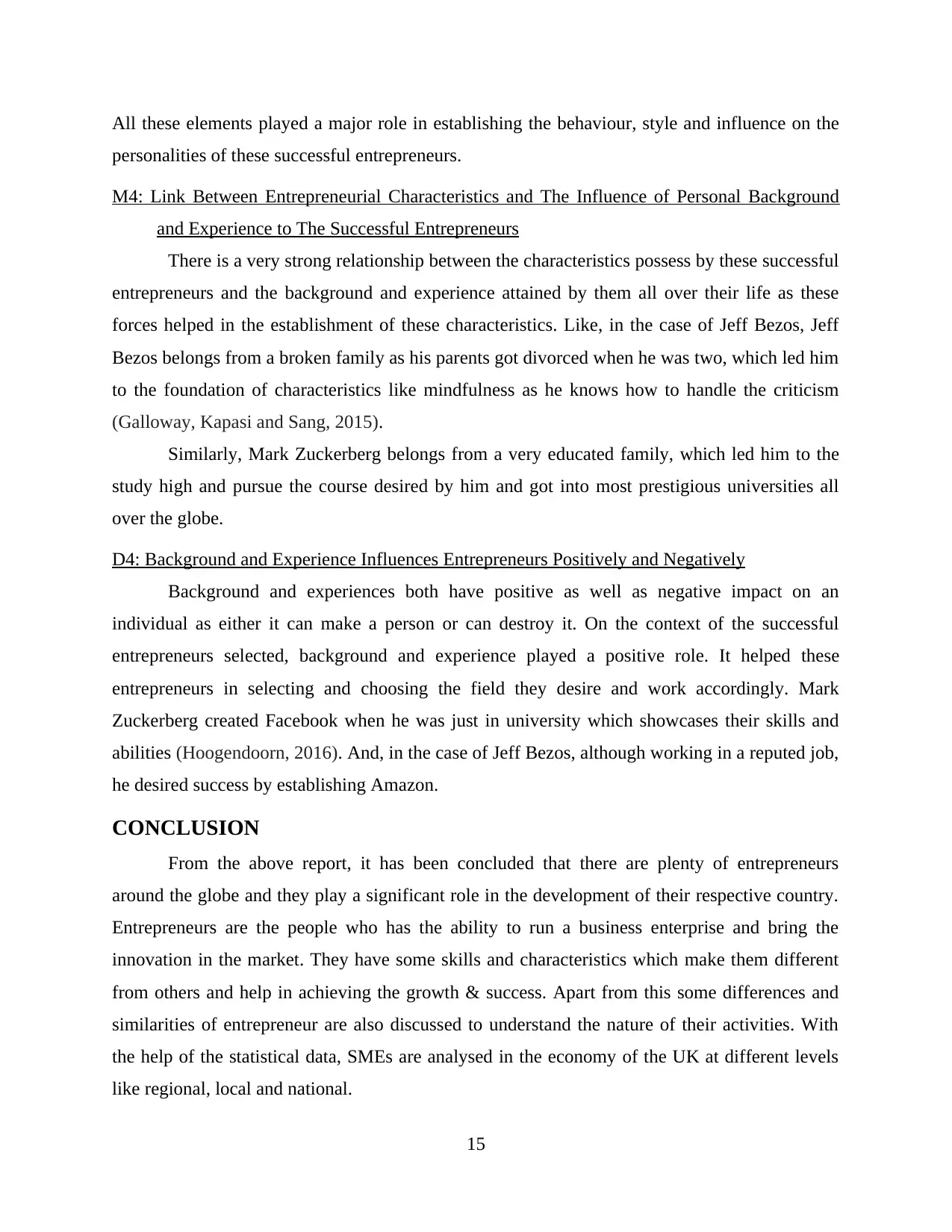
All these elements played a major role in establishing the behaviour, style and influence on the
personalities of these successful entrepreneurs.
M4: Link Between Entrepreneurial Characteristics and The Influence of Personal Background
and Experience to The Successful Entrepreneurs
There is a very strong relationship between the characteristics possess by these successful
entrepreneurs and the background and experience attained by them all over their life as these
forces helped in the establishment of these characteristics. Like, in the case of Jeff Bezos, Jeff
Bezos belongs from a broken family as his parents got divorced when he was two, which led him
to the foundation of characteristics like mindfulness as he knows how to handle the criticism
(Galloway, Kapasi and Sang, 2015).
Similarly, Mark Zuckerberg belongs from a very educated family, which led him to the
study high and pursue the course desired by him and got into most prestigious universities all
over the globe.
D4: Background and Experience Influences Entrepreneurs Positively and Negatively
Background and experiences both have positive as well as negative impact on an
individual as either it can make a person or can destroy it. On the context of the successful
entrepreneurs selected, background and experience played a positive role. It helped these
entrepreneurs in selecting and choosing the field they desire and work accordingly. Mark
Zuckerberg created Facebook when he was just in university which showcases their skills and
abilities (Hoogendoorn, 2016). And, in the case of Jeff Bezos, although working in a reputed job,
he desired success by establishing Amazon.
CONCLUSION
From the above report, it has been concluded that there are plenty of entrepreneurs
around the globe and they play a significant role in the development of their respective country.
Entrepreneurs are the people who has the ability to run a business enterprise and bring the
innovation in the market. They have some skills and characteristics which make them different
from others and help in achieving the growth & success. Apart from this some differences and
similarities of entrepreneur are also discussed to understand the nature of their activities. With
the help of the statistical data, SMEs are analysed in the economy of the UK at different levels
like regional, local and national.
15
personalities of these successful entrepreneurs.
M4: Link Between Entrepreneurial Characteristics and The Influence of Personal Background
and Experience to The Successful Entrepreneurs
There is a very strong relationship between the characteristics possess by these successful
entrepreneurs and the background and experience attained by them all over their life as these
forces helped in the establishment of these characteristics. Like, in the case of Jeff Bezos, Jeff
Bezos belongs from a broken family as his parents got divorced when he was two, which led him
to the foundation of characteristics like mindfulness as he knows how to handle the criticism
(Galloway, Kapasi and Sang, 2015).
Similarly, Mark Zuckerberg belongs from a very educated family, which led him to the
study high and pursue the course desired by him and got into most prestigious universities all
over the globe.
D4: Background and Experience Influences Entrepreneurs Positively and Negatively
Background and experiences both have positive as well as negative impact on an
individual as either it can make a person or can destroy it. On the context of the successful
entrepreneurs selected, background and experience played a positive role. It helped these
entrepreneurs in selecting and choosing the field they desire and work accordingly. Mark
Zuckerberg created Facebook when he was just in university which showcases their skills and
abilities (Hoogendoorn, 2016). And, in the case of Jeff Bezos, although working in a reputed job,
he desired success by establishing Amazon.
CONCLUSION
From the above report, it has been concluded that there are plenty of entrepreneurs
around the globe and they play a significant role in the development of their respective country.
Entrepreneurs are the people who has the ability to run a business enterprise and bring the
innovation in the market. They have some skills and characteristics which make them different
from others and help in achieving the growth & success. Apart from this some differences and
similarities of entrepreneur are also discussed to understand the nature of their activities. With
the help of the statistical data, SMEs are analysed in the economy of the UK at different levels
like regional, local and national.
15

16
Secure Best Marks with AI Grader
Need help grading? Try our AI Grader for instant feedback on your assignments.
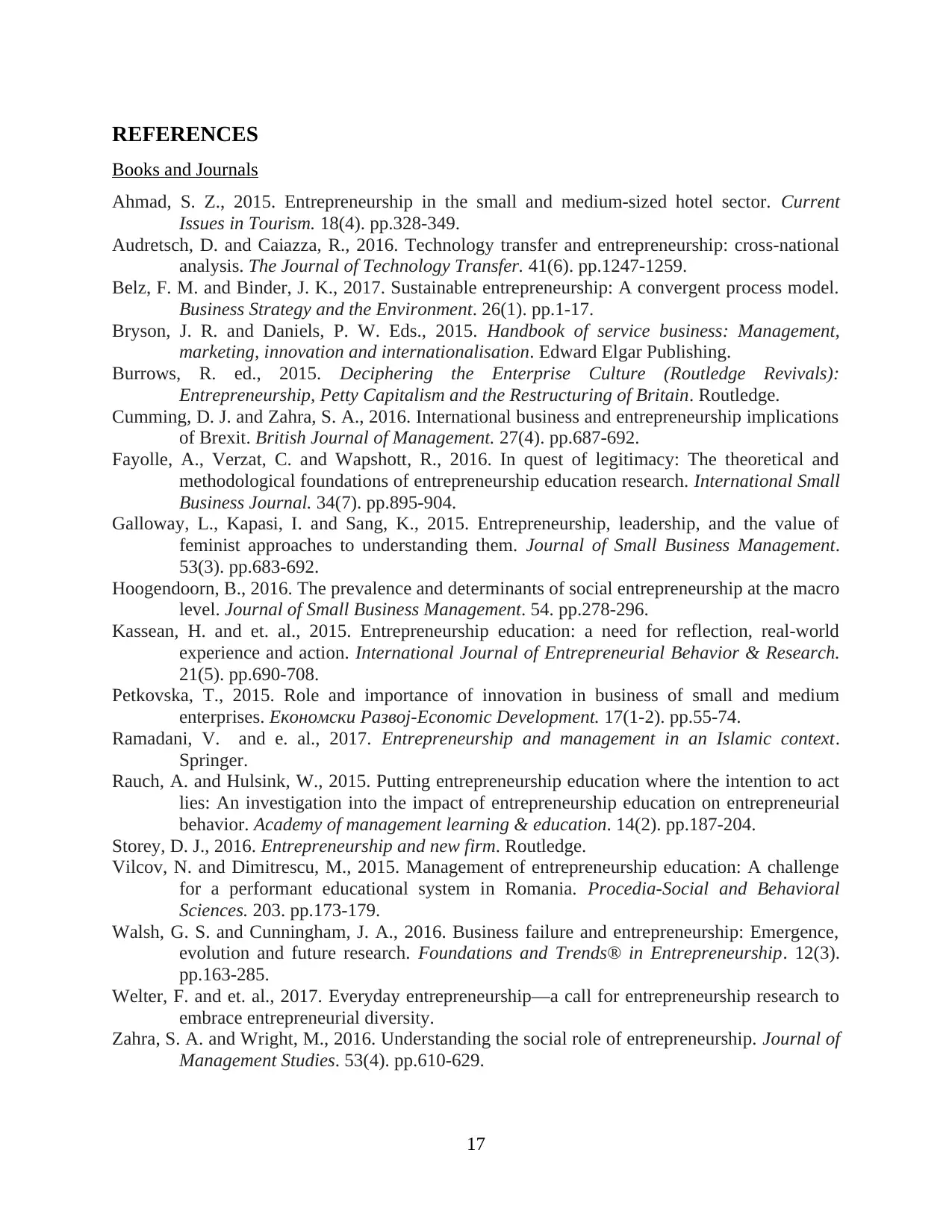
REFERENCES
Books and Journals
Ahmad, S. Z., 2015. Entrepreneurship in the small and medium-sized hotel sector. Current
Issues in Tourism. 18(4). pp.328-349.
Audretsch, D. and Caiazza, R., 2016. Technology transfer and entrepreneurship: cross-national
analysis. The Journal of Technology Transfer. 41(6). pp.1247-1259.
Belz, F. M. and Binder, J. K., 2017. Sustainable entrepreneurship: A convergent process model.
Business Strategy and the Environment. 26(1). pp.1-17.
Bryson, J. R. and Daniels, P. W. Eds., 2015. Handbook of service business: Management,
marketing, innovation and internationalisation. Edward Elgar Publishing.
Burrows, R. ed., 2015. Deciphering the Enterprise Culture (Routledge Revivals):
Entrepreneurship, Petty Capitalism and the Restructuring of Britain. Routledge.
Cumming, D. J. and Zahra, S. A., 2016. International business and entrepreneurship implications
of Brexit. British Journal of Management. 27(4). pp.687-692.
Fayolle, A., Verzat, C. and Wapshott, R., 2016. In quest of legitimacy: The theoretical and
methodological foundations of entrepreneurship education research. International Small
Business Journal. 34(7). pp.895-904.
Galloway, L., Kapasi, I. and Sang, K., 2015. Entrepreneurship, leadership, and the value of
feminist approaches to understanding them. Journal of Small Business Management.
53(3). pp.683-692.
Hoogendoorn, B., 2016. The prevalence and determinants of social entrepreneurship at the macro
level. Journal of Small Business Management. 54. pp.278-296.
Kassean, H. and et. al., 2015. Entrepreneurship education: a need for reflection, real-world
experience and action. International Journal of Entrepreneurial Behavior & Research.
21(5). pp.690-708.
Petkovska, T., 2015. Role and importance of innovation in business of small and medium
enterprises. Економски Развој-Economic Development. 17(1-2). pp.55-74.
Ramadani, V. and e. al., 2017. Entrepreneurship and management in an Islamic context.
Springer.
Rauch, A. and Hulsink, W., 2015. Putting entrepreneurship education where the intention to act
lies: An investigation into the impact of entrepreneurship education on entrepreneurial
behavior. Academy of management learning & education. 14(2). pp.187-204.
Storey, D. J., 2016. Entrepreneurship and new firm. Routledge.
Vilcov, N. and Dimitrescu, M., 2015. Management of entrepreneurship education: A challenge
for a performant educational system in Romania. Procedia-Social and Behavioral
Sciences. 203. pp.173-179.
Walsh, G. S. and Cunningham, J. A., 2016. Business failure and entrepreneurship: Emergence,
evolution and future research. Foundations and Trends® in Entrepreneurship. 12(3).
pp.163-285.
Welter, F. and et. al., 2017. Everyday entrepreneurship—a call for entrepreneurship research to
embrace entrepreneurial diversity.
Zahra, S. A. and Wright, M., 2016. Understanding the social role of entrepreneurship. Journal of
Management Studies. 53(4). pp.610-629.
17
Books and Journals
Ahmad, S. Z., 2015. Entrepreneurship in the small and medium-sized hotel sector. Current
Issues in Tourism. 18(4). pp.328-349.
Audretsch, D. and Caiazza, R., 2016. Technology transfer and entrepreneurship: cross-national
analysis. The Journal of Technology Transfer. 41(6). pp.1247-1259.
Belz, F. M. and Binder, J. K., 2017. Sustainable entrepreneurship: A convergent process model.
Business Strategy and the Environment. 26(1). pp.1-17.
Bryson, J. R. and Daniels, P. W. Eds., 2015. Handbook of service business: Management,
marketing, innovation and internationalisation. Edward Elgar Publishing.
Burrows, R. ed., 2015. Deciphering the Enterprise Culture (Routledge Revivals):
Entrepreneurship, Petty Capitalism and the Restructuring of Britain. Routledge.
Cumming, D. J. and Zahra, S. A., 2016. International business and entrepreneurship implications
of Brexit. British Journal of Management. 27(4). pp.687-692.
Fayolle, A., Verzat, C. and Wapshott, R., 2016. In quest of legitimacy: The theoretical and
methodological foundations of entrepreneurship education research. International Small
Business Journal. 34(7). pp.895-904.
Galloway, L., Kapasi, I. and Sang, K., 2015. Entrepreneurship, leadership, and the value of
feminist approaches to understanding them. Journal of Small Business Management.
53(3). pp.683-692.
Hoogendoorn, B., 2016. The prevalence and determinants of social entrepreneurship at the macro
level. Journal of Small Business Management. 54. pp.278-296.
Kassean, H. and et. al., 2015. Entrepreneurship education: a need for reflection, real-world
experience and action. International Journal of Entrepreneurial Behavior & Research.
21(5). pp.690-708.
Petkovska, T., 2015. Role and importance of innovation in business of small and medium
enterprises. Економски Развој-Economic Development. 17(1-2). pp.55-74.
Ramadani, V. and e. al., 2017. Entrepreneurship and management in an Islamic context.
Springer.
Rauch, A. and Hulsink, W., 2015. Putting entrepreneurship education where the intention to act
lies: An investigation into the impact of entrepreneurship education on entrepreneurial
behavior. Academy of management learning & education. 14(2). pp.187-204.
Storey, D. J., 2016. Entrepreneurship and new firm. Routledge.
Vilcov, N. and Dimitrescu, M., 2015. Management of entrepreneurship education: A challenge
for a performant educational system in Romania. Procedia-Social and Behavioral
Sciences. 203. pp.173-179.
Walsh, G. S. and Cunningham, J. A., 2016. Business failure and entrepreneurship: Emergence,
evolution and future research. Foundations and Trends® in Entrepreneurship. 12(3).
pp.163-285.
Welter, F. and et. al., 2017. Everyday entrepreneurship—a call for entrepreneurship research to
embrace entrepreneurial diversity.
Zahra, S. A. and Wright, M., 2016. Understanding the social role of entrepreneurship. Journal of
Management Studies. 53(4). pp.610-629.
17
1 out of 17
Related Documents
Your All-in-One AI-Powered Toolkit for Academic Success.
+13062052269
info@desklib.com
Available 24*7 on WhatsApp / Email
![[object Object]](/_next/static/media/star-bottom.7253800d.svg)
Unlock your academic potential
© 2024 | Zucol Services PVT LTD | All rights reserved.





